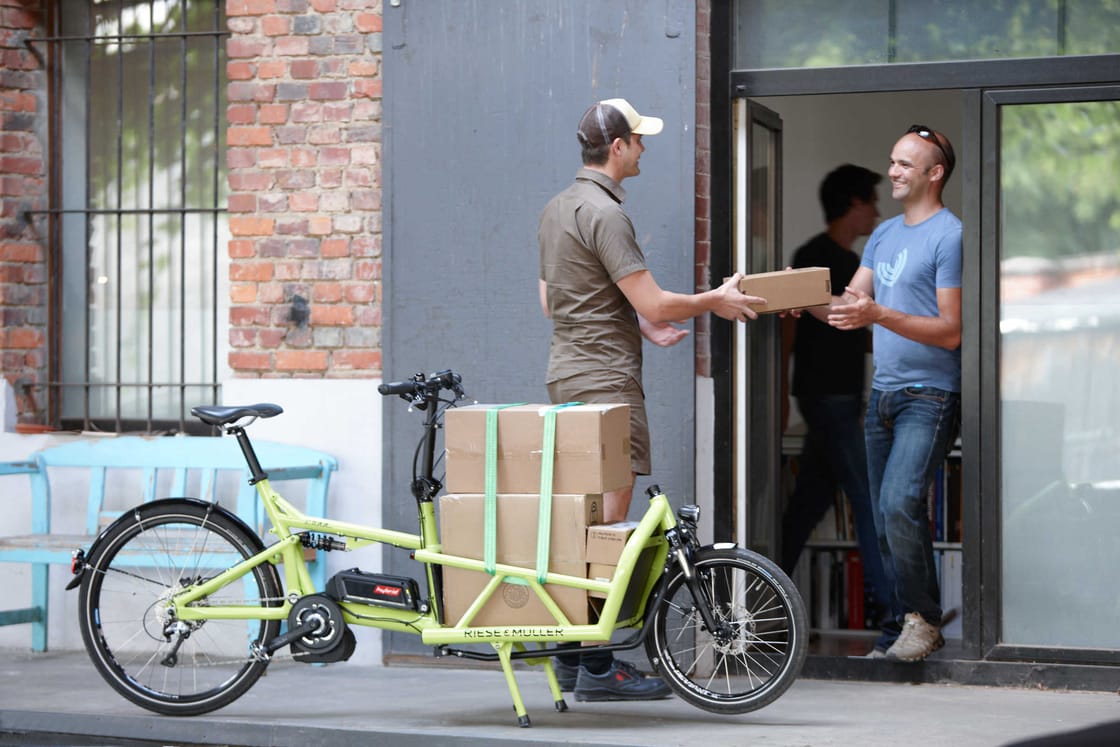The cargo bike: transporting loads by bicycle?
Most municipalities have now banned heavy truck traffic from their city centers, literally and figuratively giving themselves some breathing room. But with the number of courier, express and parcel services (CEP for short) growing rapidly both in the past and in the future, they are facing new challenges.
According to figures from the Bundesverband Paket und Expresslogistik (BIEK), the CEP shipment volume grew by 57% between 2000 and 2013. The consequences: parked delivery trucks in the second row or on sidewalks and bike paths, dangerous overtaking maneuvers, and chronic congestion of already overloaded traffic routes.
Logistics service providers are looking for new approaches – together with cities and municipalities.
The trend towards more and more CEP traffic will continue in the future. According to experts, there is no doubt about that. In addition to growing internet trade in the B2C sector, the main driver of this development is the increasing competitive pressure in the retail sector, which is leading to a further reduction in warehouse space.
Smaller stores in particular are dependent on the optimization of supply chains under the keyword “just in time”. Against this background, logistics service providers are now also looking for new approaches. In its “Sustainability Study on Inner-City Logistics” (02/2015), BIEK calls for intensive cooperation with cities and municipalities. The common goal: efficient and sustainable transport of goods. This is because the majority of “last mile” pickups and deliveries take place in urban centers.
With new rules, micro depots and cargo bikes to the destination
The objective of achieving a high quality of stay and quality of life in cities and municipalities and safe transport routes for all is already being thwarted by current delivery traffic. There are certainly possible solutions, but they require close cooperation between all parties involved – CEP service providers, retailers and various departments in the municipalities themselves. This includes planning measures such as the designation of new loading zones, including much more consistent traffic monitoring, as well as legislative measures to privilege commercial traffic in loading areas. Example: Introduction of the “zigzag line”, sign 299 StVO, in connection with a new traffic sign “loading area”.
It also seems sensible and necessary to further promote automated lockers and central pick-up stations, as well as the establishment of so-called micro-depositories. The latter serve as transshipment points (hubs) from which deliveries are made in the local area on foot or by cargo bike. The cargo bike can take on an important function here in the future, as it extends the radius and the efficiency of the delivery staff around the hub and offers the possibility of storing shipments safely and protected from the weather in boxes.
The cargo bike renaissance has already begun
In Europe, cargo bikes were a natural and cost-effective alternative to carts and horse-drawn carriages for many years. In cycling countries such as the Netherlands or Denmark, they have now become a matter of course again. Practical reasons and a modern “lifestyle of health and sustainability” make the versatile bikes, which are now available in all kinds of variations with and without motor assistance, popular with delivery services, craftsmen, retailers and many families. In Germany, too, modern cargo bikes are now practical helpers, proof of a new attitude and a status symbol for young urban families. Special cargo pedelecs are also increasingly replacing scooters and cars for delivery services, such as pizza delivery.
The central arguments: speed and no parking problems when transporting from A to B, as well as low maintenance costs. With delivery pedelecs covering up to 30,000 km per year for service providers such as Joey’s Pizza, there are tangible economic benefits for companies.
Source: “nahmobil” of the Arbeitsgemeinschaft fußgänger- und fahrradfreundlicher Städte, Gemeinden und Kreise in NRW e.V. (AGFS), Konrad-Adenauer-Platz 17 – 47803 Krefeld
http://agfs-nrw.de
